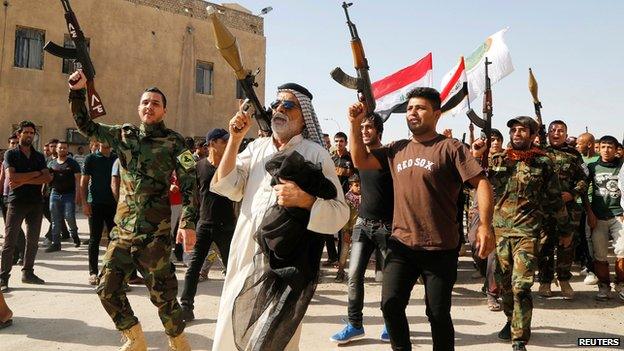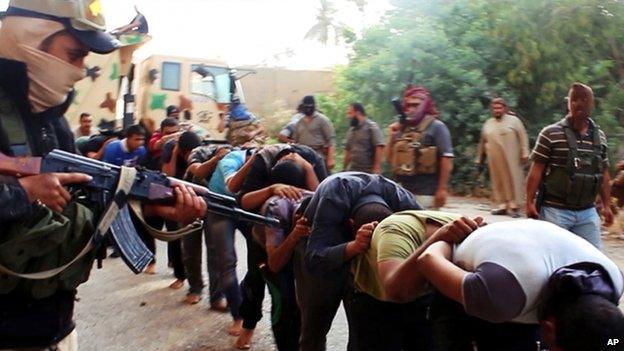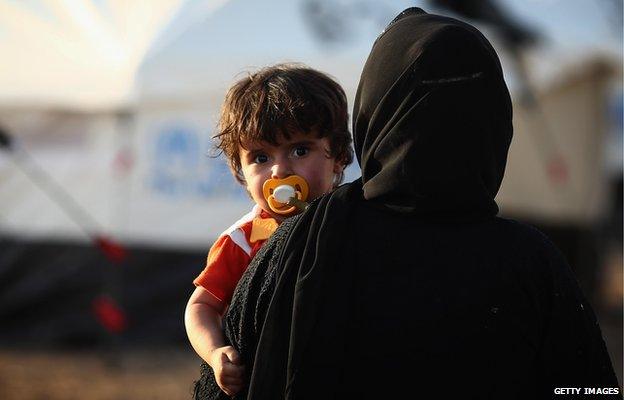Iraq crisis: Reporters' round-up
- Published

Large crowds of volunteers have joined the Iraqi army parade in Baghdad
As the Sunni extremist group that has taken territory across Iraq posts photos online that appear to show its fighters massacring a large number of Iraqi army personnel, here is a round-up of the latest reports from BBC correspondents covering the crisis.
Sunday

Gruesome images: BBC's Jim Muir, northern Iraq
If the images purportedly put out by ISIS itself are genuine - and there is little to indicate they are not - the methodical massacre of hundreds of Shia soldiers from the Iraqi army that the document is likely to inflame sectarian passions yet further.
That indeed may be one of the main objectives of ISIS in disseminating the gruesome pictures. Its narrative is consistently sectarian and provocative, as was that of its precursor, al-Qaeda in Iraq, when sectarian bloodletting between Sunnis and Shia was at its height in 2005-6.
The detonation of bombs and suicide attacks in mainly Shia neighbourhoods and against Shia pilgrims, for which ISIS has taken responsibility, all tend in that direction. So, too, did a statement last week by the ISIS spokesman urging the Sunni militants to march on the southern city of Kerbala, revered by the Shia.
ISIS has never shrunk from publishing images of its fighters committing what much of the world would consider atrocities and war crimes. It has no inclination to court international opinion, and it may be a useful way of striking fear into the hearts of its enemies.

The pictures appear to show captured Iraqi soldiers in civilian clothes being led away by militants - and also images purporting to show mass executions

Panic subsiding: John Simpson, BBC News, Baghdad
On my way into the BBC office [on Sunday] I bumped into a government minister who I know, and he told me that there was a real state of panic here a few days ago. Thursday in particular, he said, nobody knew what to say, they could scarcely speak to each other they were so nervous.
But since then, the idea that Shia fighters, Shia volunteers should come forward and back the army up has restored a certain amount of balance here. He said that the government feels a lot more settled at the moment.
Of course you could say that's a problem for the future of this country, if one religious group is setting out to fight another one - and that blatantly. But that is something else, something for the future. For the moment it seems that there is a bit of a sense that things are settling down.

Saturday
Iraqi forces fight back: Paul Wood, northern Iraq
Kurdish and Shia groups have formed militias to combat the Sunni insurgents, as Paul Wood reports

Preparing to fight: Richard Galpin in Baghdad
A long line of pick-up trucks and cars sped through the streets of central Baghdad on Saturday filled with heavily armed men, a cacophony of blaring horns, sirens and pumping music heralding their arrival.
It was evidence that the call to arms made on Friday by the most senior Shia religious leader Grand Ayatollah Ali al-Sistani, was being heeded in the capital as in other cities, particularly in the Shia-dominated south.
The convoy was manned by members of a Shia militia called the Mahdi army. The militia has sprung back to life in recent days, after lying low following its notorious role in the sectarian conflict with the minority Sunni community which came to an end about six years ago.
One cleric, sitting with a driver and bodyguard in an expensive four-by-four, said they were prepared to fight to the death and "splash their blood" to rid Iraq of the ISIS "terrorists".
Other members of the militia said they would help defend Baghdad and head further north to bolster the regular army on the frontlines in Diyala and Salahaddin provinces.

President Rouhani: "If the government of Iraq requests any help we are of course ready to consider it"
Iran's role: Analysis from Kasra Naji, BBC Persian
President Rouhani reassured Iranians that their young men would not be sent to Iraq - not yet, anyway. It is clear that his government is far from keen on putting boots on the ground in Iraq.
But at the same time, Iraq is a neighbour and a pivotal ally. Iran has been working hard in the past 10 years or so to help put in place a pro-Tehran government in Baghdad. Any threat to the status quo will be a serious blow to these efforts.
There are credible reports that the top commander of Iran's Quds Force, General Qassem Suleimani, is in Baghdad, helping to strengthen the defences of the capital and the northern holy city of Samarra, and organise and co-ordinate Iraqi Shia militia groups which are loyal to Iran.
And a source in the Iraqi province of Diyala, neighbouring Iran, has told the BBC that more than 130 members of Iran's Revolutionary Guard have entered the province with the aim of providing military training and advice. The source - who said the Revolutionary Guards did not plan to get involved in fighting - also said Iran had put two divisions of its forces on alert along the border with Iraq.
President Rouhani said he believed Iraq was capable of defending itself, but added that Iran was willing to co-operate with the US "to combat terrorism". It will not be surprising if there are contacts between the two sides already, in spite of their decades of animosity.


Kurds seize the advantage: Jim Muir in Irbil, Iraqi Kurdistan
The alarming tide of refugees fleeing Mosul for Iraqi Kurdistan has died down as the situation there has quietened, but the influx will be an additional burden on the autonomous region.
However, while much of the rest of Iraq is embroiled in turmoil and anxiety, the Kurds in the north are quietly benefiting from the upheavals, while keeping a vigilant eye on the dangers that accompany the opportunities.
Following the collapse of the Iraqi military, Kurdish forces have moved into vacated positions in virtually all the historically disputed lands along the ethnic faultline between Kurds and Arabs.
That includes the oil-rich but demographically mixed province of Kirkuk, which could strengthen the Kurds' thirst for independence while making them more exposed to attacks.
Since the overthrow of Saddam Hussein, the Kurds have often played the role of conciliators between feuding Sunnis and Shia in Iraqi national politics.
But those days may now have passed.
